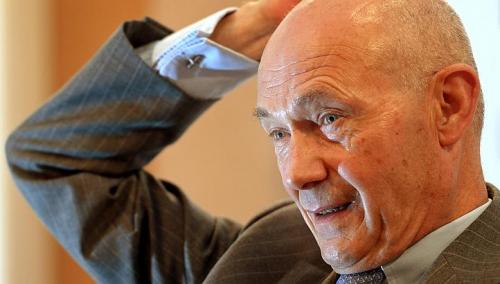WTO chief: China is the panacea, not the problem
Updated: 2012-10-09 14:40
(asianewsnet.net)
|
||||||||
Protectionism is rearing its ugly head in many countries struggling to create jobs for their people, boost business and get fresh capital.
But World Trade Organization director-general Pascal Lamy thinks protectionism's ill-effects have been greatly exaggerated - for now.
|
 If China's economy were not what it is today, the world would be worse off, says Pascal Lamy. [Photo / asianewsnet.net] |
Lamy, 65, was speaking to The Straits Times last month, ahead of this year's Singapore Global Dialogue, a yearly pow-wow on strategic security issues organized by the S.Rajaratnam School of International Studies.
In fact, he stressed: "If China's economy were not what it is today, the rest of the world would probably be worse off."
Related reading: China takes up 'sizeable portion' of global growth
For one thing, he says, only 3 percent of total world merchandise trade today, or $546 billion, is currently affected by protectionism.
Lamy defines protectionism as the net fallout between trade-restrictive and trade-friendly measures put in place by the WTO's 157 member countries, whose latest entrants are Russia and Vanuatu.
For another, bad press notwithstanding, in fact the leaders of most countries understand that protectionism doesn't work because their economies are so intertwined today.
Technology has changed the pattern of global trade fundamentally in the past 20 years. Countries are now more dependent on one another for goods and services to meet shortened and increasingly frenzied manufacturing cycles, to meet growing global demand.
As an example, he says, about 40 percent of any exported product consists of imported material too. That is double the imported content of just 20 years ago. "So," he stresses, "shooting on your imports today means shooting on your exports too. That is why protectionism does not protect jobs."
Without China, the world would be "far worse off" economically, because the dragon is importing so many of the world's products that China's rate of growth in imports has been between 15 percent and 20 percent a year for the past 10 years.
Still, the WTO is monitoring pockets of protectionism around the world, despite their minimal effects on global trade for now. That's because creeping trade restrictions are like "bad cholesterol" - hard to detect in small amounts but heart-stopping if allowed to accumulate.
But for now, he stresses, the world's trade arteries are still fairly clear.
What everyone should really focus on instead, is how to grow their economies for the future.
One reason for the global economic slowdown today, he argues, is that developed countries don't know how to deal with the shift of economic power from the West to China, or what he calls "this big rebalancing of the planet".
For example, the United States has a wrong view of China: "To the US, the rise of China was economically more a challenge than an opportunity, more a threat than a good thing."
- WB lowers China growth forecast
- Stability achieved; now, efficiency
- Co-op with China boosts African infrastructure
- China's economy transferring to new growth engines: Russian expert
- China-bashing talks useless to US economy
- China backs EU efforts to address debt crisis
- China to work with emerging-market economies: VP
- China's reform, opening-up contributes to world economy

 Relief reaches isolated village
Relief reaches isolated village
 Rainfall poses new threats to quake-hit region
Rainfall poses new threats to quake-hit region
 Funerals begin for Boston bombing victims
Funerals begin for Boston bombing victims
 Quake takeaway from China's Air Force
Quake takeaway from China's Air Force
 Obama celebrates young inventors at science fair
Obama celebrates young inventors at science fair
 Earth Day marked around the world
Earth Day marked around the world
 Volunteer team helping students find sense of normalcy
Volunteer team helping students find sense of normalcy
 Ethnic groups quick to join rescue efforts
Ethnic groups quick to join rescue efforts
Most Viewed
Editor's Picks

|

|

|

|

|

|
Today's Top News
Health new priority for quake zone
Xi meets US top military officer
Japan's boats driven out of Diaoyu
China mulls online shopping legislation
Bird flu death toll rises to 22
Putin appoints new ambassador to China
Japanese ships blocked from Diaoyu Islands
Inspired by Guan, more Chinese pick up golf
US Weekly

|

|






